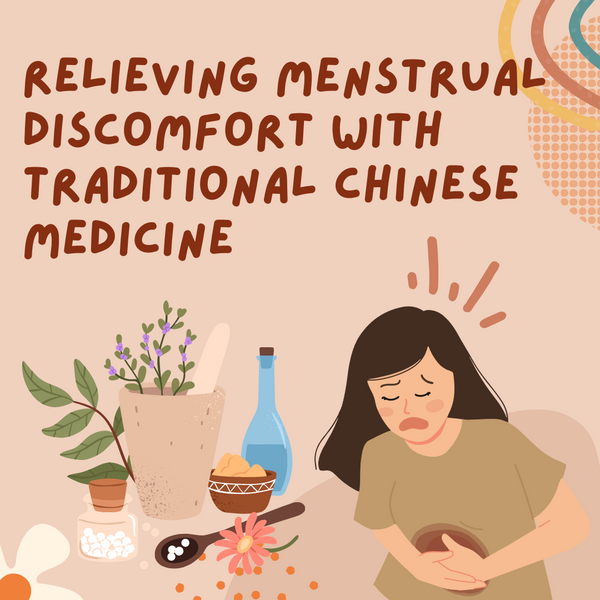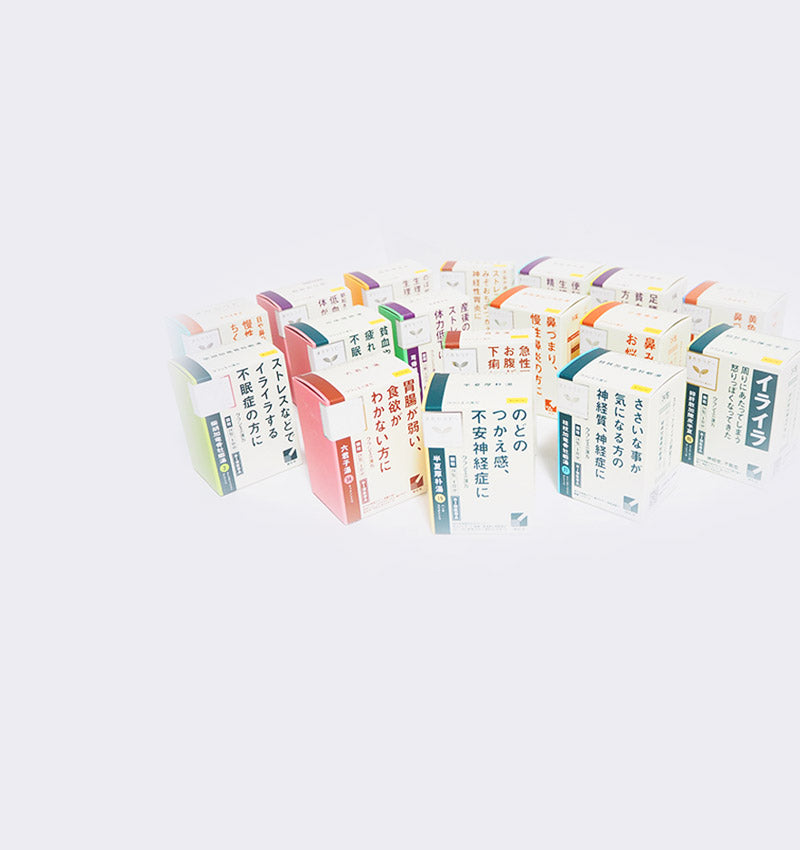
Premenstrual Syndrome (PMS) refers to the psychological and physical symptoms that occur 3 to 10 days before menstruation and generally improve or disappear with the onset of menstruation. In traditional Chinese medicine, formulations that aim to regulate blood circulation and address deficiencies are commonly used in the treatment of PMS.
Join us in this article as we delve into the realm of traditional Chinese medicine for Premenstrual Syndrome (PMS). Discover the potential benefits that Traditional Chinese Medicine holds for addressing PMS symptoms. Additionally, we'll shed light on the crucial considerations and risks associated with integrating herbal remedies into your journey for managing both PMS and Premenstrual Dysphoric Disorder (PMDD).
- 1 What is PMS?
- 2 What is PMDD?
- 3 Which One Should You Choose: Western Medicine or Traditional Chinese Medicine?
- 4 The Traditional Chinese Herbal Medicines Effective for PMS/PMDD
- 4.1 当帰芍薬散 (Toki-shakuyaku-san/ Danggui Shaoyao San)
- 4.2 補中益気湯 (Hochu-ekki-to/ Bu-Zhong-Yi-Qi-Tang)
- 4.3 抑肝散 (Yokkan-san/ Yigansan)
- 4.4 桂枝茯苓丸 (Keishi-bukuryo-gan/ Gui Zhi Fu Ling Wan)
- 5 Can traditional Chinese medicine cause serious side effects?
What is PMS?
PMS, an abbreviation for Premenstrual Syndrome, is formally referred to as premenstrual syndrome. PMS encompasses psychological or physical symptoms that persist for 3 to 10 days before menstruation and generally alleviate or disappear with the onset of menstruation. Specific psychological symptoms associated with PMS include depression, irritability, and anxiety, while physical symptoms may include breast tenderness, swelling, and headaches. Moreover, symptoms vary widely among individuals, with approximately 200 different types reported. Commonly mentioned symptoms include the following:
| Physical Symptoms | Psychological Symptoms |
|---|---|
| Abdominal bloating | Depression symptoms |
| Abdominal pain | Irritability |
| Constipation | Anxiety |
| Diarrhea | Decreased concentration |
| Nausea | Lack of energy |
| Headaches | Fatigue |
| Breast pain | Excessive sleep |
| Breast tenderness | Insomnia |
| Lower back pain | |
| Overeating | |
| Appetite changes | |
| Shoulder stiffness | |
| Swelling | |
| Dizziness | |
| Skin problems | |
| Acne | |
| Palpitations |
What is PMDD?
Among PMS symptoms, there is a condition where emotional symptoms such as irritability, mood swings, anxiety, and increased irritability are pronounced. This condition is known as PMDD (Premenstrual Dysphoric Disorder), or Premenstrual Dysphoric Disorder.
Which one should you choose: Western medicine or traditional Chinese medicine?
In Western medicine, the primary goal is to suppress the symptoms that are predominantly occurring. Medications tailored to specific symptoms, such as antiemetics for nausea and antidepressants for depressive states, are used to address each symptom. If a prompt alleviation of symptoms is desired, Western medicine may be more suitable.
To balance female hormones, treatment often involves the use of oral contraceptives (birth control pills). However, challenges arise based on individual constitutions, where some may experience difficulty with contraceptive pills due to side effects, or find them less accessible when desiring pregnancy. Additionally, medications like antidepressants or anti-anxiety drugs, which are effective in improving depressive or emotionally unstable states, may raise concerns about side effects like drowsiness or decreased alertness.
On the other hand, traditional Chinese medicine (TCM) approaches improvement by considering the overall balance of the body and individual constitution rather than addressing each symptom separately. Even with similar symptoms, the choice of herbal remedies in TCM varies depending on individual constitutions. The notable advantage of TCM lies in its ability to simultaneously improve multiple symptoms, such as headaches and irritability, by harmonizing the overall balance.
It is recommended to choose an appropriate approach based on individual symptoms and needs.
The traditional Chinese herbal medicines effective for PMS/PMDD
In traditional Chinese medicine, herbal remedies aim to improve overall well-being by harmonizing the balance of both the body and mind, including hormonal balance. Therefore, they can be effective even when multiple symptoms coexist. The choice of herbal remedies can be based on applicable symptoms and the current level of physical condition. In this text, we will introduce medications effective for PMS and PMDD, categorized by relevant symptoms.
| Type of Medicine | Symptoms |
|---|---|
| 当帰芍薬散 (Toki-shakuyaku-san) | Weakened Physical Strength: Coldness, anemia, easy fatigue, lower abdominal pain, heavy-headedness, dizziness, shoulder stiffness, etc. |
| 補中益気湯 (Hochu-ekki-to) | Weakened Physical Strength: Fatigue, tiredness, loss of appetite, etc. |
| 抑肝散 (Yokkan-san) | Moderate Physical Strength: Easily angered, irritability |
| 桂枝茯苓丸 (Keishi-bukuryo-gan) | Relatively Strong Physical Strength: Lower abdominal pain, shoulder stiffness, heaviness in the head, dizziness, hot flashes, and coldness in the feet, etc. |
当帰芍薬散 (Toki-shakuyaku-san/ danggui shaoyao san)
Kampo Medicine Effective for Women's Specific Concerns (Menstrual Irregularities, Cold Sensation, etc.) "Toki-shakuyaku-san," recommended for individuals experiencing common women's concerns such as cold lower extremities and menstrual irregularities, is a medicinal formula known in English as "Toki-shakuyaku-san" or "Danggui Shaoyao San."
Blood, responsible for transporting nutrients and oxygen throughout the body, plays a crucial role in Traditional Chinese Medicine (TCM). TCM emphasizes nourishing the entire body through the concept of "Blood" or "Ketsu." In approximately 28 days, TCM believes that the invisible life energy, known as "Qi," gathers "Blood" from the entire body to facilitate the menstrual cycle. The normal flow ("flow") and an adequate amount ("quantity") of "Blood" are essential for this process.
"Toki-shakuyaku-san" works by providing essential nutrients to the entire body, improving blood circulation, and regulating water metabolism. This medicinal formula aims to eliminate excess water from the body, addressing concerns such as cold sensations in the lower extremities and menstrual irregularities.
The herbal components, including Chinese Angelica Root (Tokki) and Chuanxiong (Senkyu), contribute to supplementing blood and enhancing blood circulation. Shao Yao (Peony) eases muscle cramps and improves vascular conditions. Additionally, Fuling (Poria) and Baishu (Atractylodes) among other herbs help regulate water metabolism.
補中益気湯 (Hochu-ekki-to/ Bu-Zhong-Yi-Qi-Tang)
To improve weakened digestive absorption caused by overwork, unhealthy eating habits, and a deficiency in vital energy, as well as to address the insufficient ability to produce nutrients and energy, formulations like 'Hochu-ekki-to' are used to reinforce the weakened digestive absorption function.
It is suitable for individuals experiencing long menstrual periods, periods that don't end smoothly, heavy menstrual flow with a pale color or rare whiteness, easy fatigue, lack of energy, loss of appetite, and somewhat loose bowel movements.
抑肝散 (Yokkan-san/ Yigansan)
Yokkan-san Plus Chenpi Banxia has the function of improving the stagnation of Qi and promoting blood circulation, thereby balancing the autonomic nervous system. This formulation, an addition to the traditional 'Yokkan-san' with the herbal ingredients 'Chenpi (dried tangerine peel)' and 'Banxia (Pinellia Tuber),' enhances its ability to warm the body and improve digestive function.
Yokkan-san also helps suppress the activation of the sympathetic nervous system due to stress, making it commonly used in treating the psychological symptoms of PMS. However, since the herbal components 'Toki (Chinese Angelica Root)' and 'Senkyu (Chuanxiong)' in the formulation may burden the gastrointestinal tract, Yokkan-san Plus Chenpi Banxia is recommended for individuals with weakened digestive systems.
桂枝茯苓丸 (Keishi-bukuryo-gan/ Gui Zhi Fu Ling Wan)
Guei Zhi Fu Ling Wan regulates blood circulation, promoting the distribution of nutrients throughout the body. It alleviates discomfort associated with PMS, such as irritability, skin issues, and lower abdominal pain, caused by poor blood circulation.
Can traditional Chinese medicine cause serious side effects?
Liver function impairment
Often asymptomatic and detected through blood tests, it can also present with symptoms such as fever, general fatigue, nausea, vomiting, jaundice, etc.
If left untreated, it can lead to hepatitis and pose a threat to life.
This has been frequently reported with herbal medicines containing Scutellaria baicalensis, and caution is also needed with Licorice, Bupleurum, Pinellia, Polyporus, Ginseng, and Ginger, among others. [1]
(Examples: Gui Zhi Fu Ling Wan, Toki-shakuyaku-san, Jia Wei Xiao Yao San, Yokkan-san, Nyoshin-san, etc.)
Pseudoaldosteronism
Pseudoaldosteronism occur with the excessive intake of licorice. Symptoms such as fatigue, numbness in the limbs, elevated blood pressure, palpitations, nausea, vomiting, hypokalemia, and, in severe cases, muscle weakness (myopathy) may manifest. Caution is advised due to these potential symptoms. [2]
Examples: Jia Wei Xiao Yao San, Yokkan-san Chenpi Banxia, Ling Gui Zhu Gan Tang)
Traditional herbal medicines often have gentle effects, giving a sense of reassurance, but the onset of side effects is also gradual, requiring caution. In times of distress, consider consulting with a doctor or pharmacist.
Disclaimer: This blog post is intended for informational purposes only and should not be considered as medical advice. As with any supplement or medication, individuals should consult their healthcare professional prior to usage, as it's important to consider potential risks and benefits in each unique case. Additionally, If you experience any allergic reactions, consult a healthcare professional before attempting any traditional medicine or herbal remedies.



